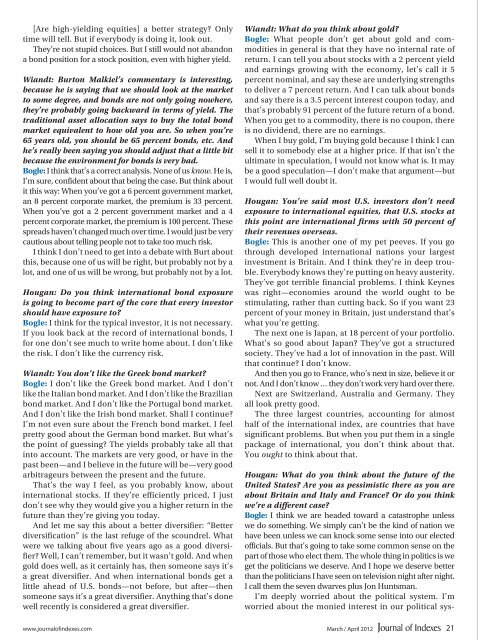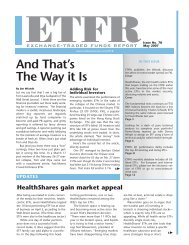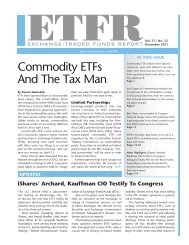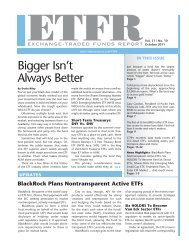You also want an ePaper? Increase the reach of your titles
YUMPU automatically turns print PDFs into web optimized ePapers that Google loves.
[Are high-yielding equities] a better strategy? Only<br />
time will tell. But if everybody is doing it, look out.<br />
They’re not stupid choices. But I still would not abandon<br />
a bond position for a stock position, even with higher yield.<br />
Wiandt: Burton Malkiel’s <strong>com</strong>mentary is interesting,<br />
because he is saying that we should look at <strong>the</strong> market<br />
to some degree, and bonds are not only going nowhere,<br />
<strong>the</strong>y’re probably going backward in terms of yield. The<br />
traditional asset allocation says to buy <strong>the</strong> total bond<br />
market equivalent to how old you are. So when you’re<br />
65 years old, you should be 65 percent bonds, etc. And<br />
he’s really been saying you should adjust that a little bit<br />
because <strong>the</strong> environment for bonds is very bad.<br />
Bogle: I think that’s a correct analysis. None of us know. He is,<br />
I’m sure, confident about that being <strong>the</strong> case. But think about<br />
it this way: When you’ve got a 6 percent government market,<br />
an 8 percent corporate market, <strong>the</strong> premium is 33 percent.<br />
When you’ve got a 2 percent government market and a 4<br />
percent corporate market, <strong>the</strong> premium is 100 percent. These<br />
spreads haven’t changed much over time. I would just be very<br />
cautious about telling people not to take too much risk.<br />
I think I don’t need to get into a debate with Burt about<br />
this, because one of us will be right, but probably not by a<br />
lot, and one of us will be wrong, but probably not by a lot.<br />
Hougan: Do you think international bond exposure<br />
is going to be<strong>com</strong>e part of <strong>the</strong> core that every investor<br />
should have exposure to?<br />
Bogle: I think for <strong>the</strong> typical investor, it is not necessary.<br />
If you look back at <strong>the</strong> record of international bonds, I<br />
for one don’t see much to write home about. I don’t like<br />
<strong>the</strong> risk. I don’t like <strong>the</strong> currency risk.<br />
Wiandt: You don’t like <strong>the</strong> Greek bond market?<br />
Bogle: I don’t like <strong>the</strong> Greek bond market. And I don’t<br />
like <strong>the</strong> Italian bond market. And I don’t like <strong>the</strong> Brazilian<br />
bond market. And I don’t like <strong>the</strong> Portugal bond market.<br />
And I don’t like <strong>the</strong> Irish bond market. Shall I continue?<br />
I’m not even sure about <strong>the</strong> French bond market. I feel<br />
pretty good about <strong>the</strong> German bond market. But what’s<br />
<strong>the</strong> point of guessing? The yields probably take all that<br />
into account. The markets are very good, or have in <strong>the</strong><br />
past been—and I believe in <strong>the</strong> future will be—very good<br />
arbitrageurs between <strong>the</strong> present and <strong>the</strong> future.<br />
That’s <strong>the</strong> way I feel, as you probably know, about<br />
international stocks. If <strong>the</strong>y’re efficiently priced, I just<br />
don’t see why <strong>the</strong>y would give you a higher return in <strong>the</strong><br />
future than <strong>the</strong>y’re giving you today.<br />
And let me say this about a better diversifier: “Better<br />
diversification” is <strong>the</strong> last refuge of <strong>the</strong> scoundrel. What<br />
were we talking about five years ago as a good diversifier?<br />
Well, I can’t remember, but it wasn’t gold. And when<br />
gold does well, as it certainly has, <strong>the</strong>n someone says it’s<br />
a great diversifier. And when international bonds get a<br />
little ahead of U.S. bonds—not before, but after—<strong>the</strong>n<br />
someone says it’s a great diversifier. Anything that’s done<br />
well recently is considered a great diversifier.<br />
Wiandt: What do you think about gold?<br />
Bogle: What people don’t get about gold and <strong>com</strong>modities<br />
in general is that <strong>the</strong>y have no internal rate of<br />
return. I can tell you about stocks with a 2 percent yield<br />
and earnings growing with <strong>the</strong> economy, let’s call it 5<br />
percent nominal, and say <strong>the</strong>se are underlying strengths<br />
to deliver a 7 percent return. And I can talk about bonds<br />
and say <strong>the</strong>re is a 3.5 percent interest coupon today, and<br />
that’s probably 91 percent of <strong>the</strong> future return of a bond.<br />
When you get to a <strong>com</strong>modity, <strong>the</strong>re is no coupon, <strong>the</strong>re<br />
is no dividend, <strong>the</strong>re are no earnings.<br />
When I buy gold, I’m buying gold because I think I can<br />
sell it to somebody else at a higher price. If that isn’t <strong>the</strong><br />
ultimate in speculation, I would not know what is. It may<br />
be a good speculation—I don’t make that argument—but<br />
I would full well doubt it.<br />
Hougan: You’ve said most U.S. investors don’t need<br />
exposure to international equities, that U.S. stocks at<br />
this point are international firms with 50 percent of<br />
<strong>the</strong>ir revenues overseas.<br />
Bogle: This is ano<strong>the</strong>r one of my pet peeves. If you go<br />
through developed international nations your largest<br />
investment is Britain. And I think <strong>the</strong>y’re in deep trouble.<br />
Everybody knows <strong>the</strong>y’re putting on heavy austerity.<br />
They’ve got terrible financial problems. I think Keynes<br />
was right—economies around <strong>the</strong> world ought to be<br />
stimulating, ra<strong>the</strong>r than cutting back. So if you want 23<br />
percent of your money in Britain, just understand that’s<br />
what you’re getting.<br />
The next one is Japan, at 18 percent of your portfolio.<br />
What’s so good about Japan? They’ve got a structured<br />
society. They’ve had a lot of innovation in <strong>the</strong> past. Will<br />
that continue? I don’t know.<br />
And <strong>the</strong>n you go to France, who’s next in size, believe it or<br />
not. And I don’t know … <strong>the</strong>y don’t work very hard over <strong>the</strong>re.<br />
Next are Switzerland, Australia and Germany. They<br />
all look pretty good.<br />
The three largest countries, accounting for almost<br />
half of <strong>the</strong> international index, are countries that have<br />
significant problems. But when you put <strong>the</strong>m in a single<br />
package of international, you don’t think about that.<br />
You ought to think about that.<br />
Hougan: What do you think about <strong>the</strong> future of <strong>the</strong><br />
United States? Are you as pessimistic <strong>the</strong>re as you are<br />
about Britain and Italy and France? Or do you think<br />
we’re a different case?<br />
Bogle: I think we are headed toward a catastrophe unless<br />
we do something. We simply can’t be <strong>the</strong> kind of nation we<br />
have been unless we can knock some sense into our elected<br />
officials. But that’s going to take some <strong>com</strong>mon sense on <strong>the</strong><br />
part of those who elect <strong>the</strong>m. The whole thing in politics is we<br />
get <strong>the</strong> politicians we deserve. And I hope we deserve better<br />
than <strong>the</strong> politicians I have seen on television night after night.<br />
I call <strong>the</strong>m <strong>the</strong> seven dwarves plus Jon Huntsman.<br />
I’m deeply worried about <strong>the</strong> political system. I’m<br />
worried about <strong>the</strong> monied interest in our political sys-<br />
www.journalofindexes.<strong>com</strong> March / April 2012 21
















